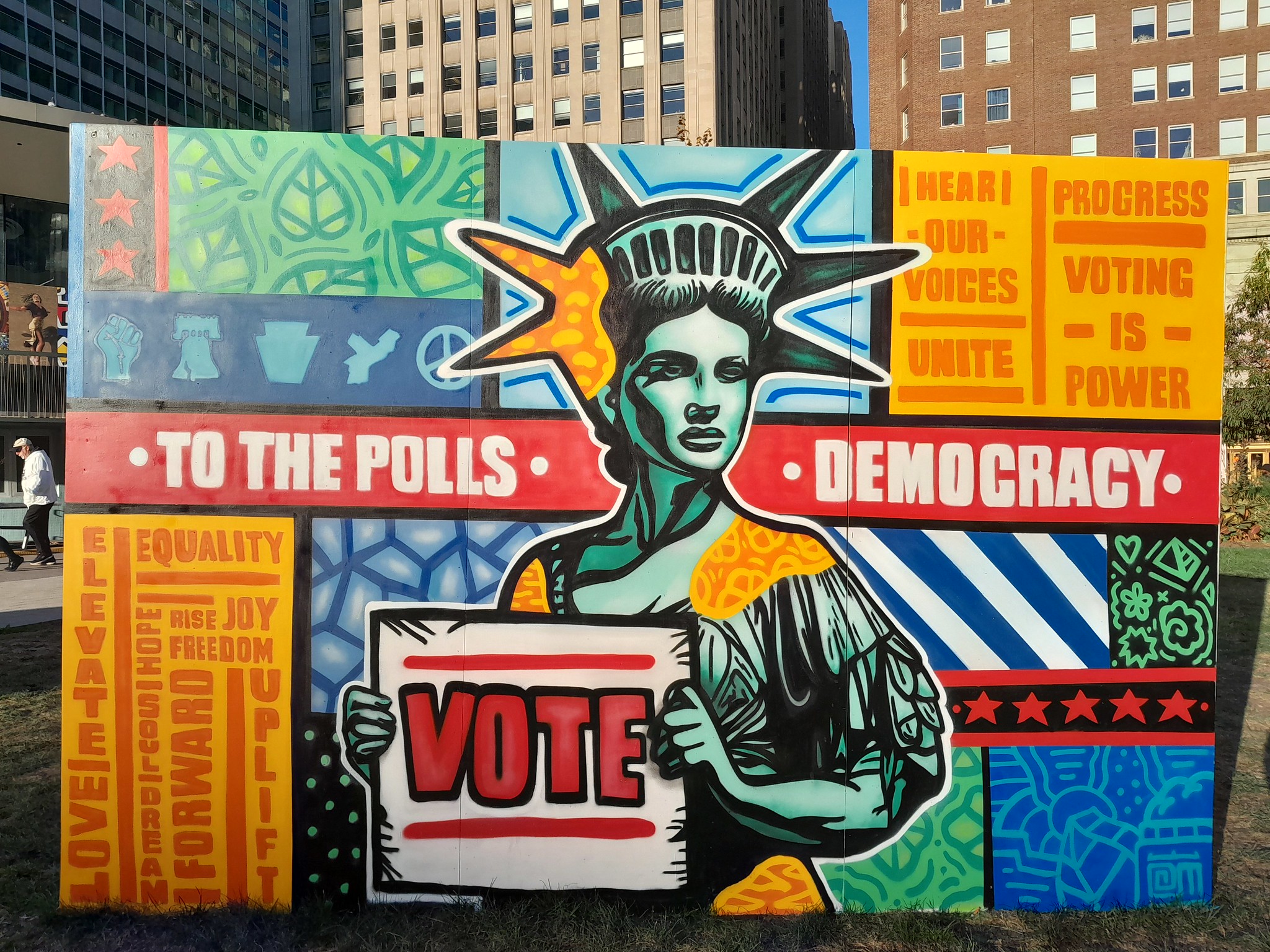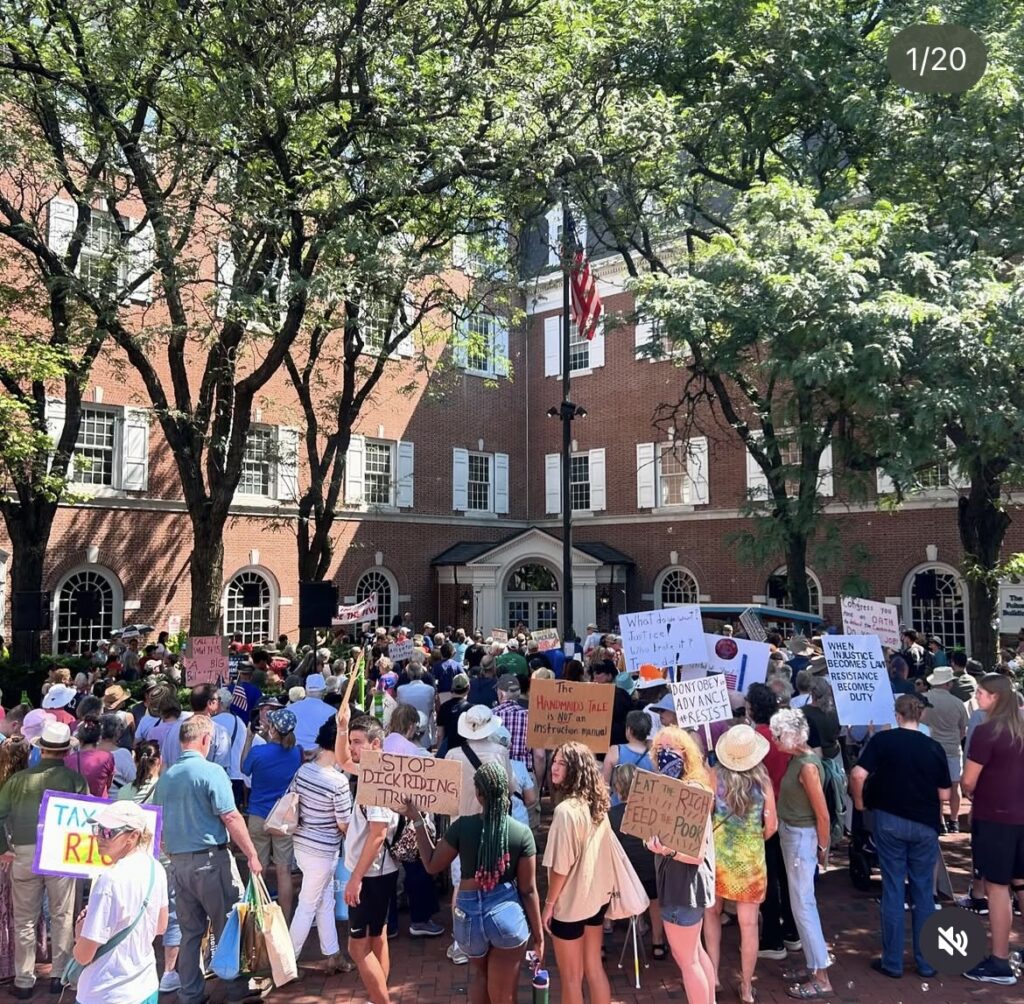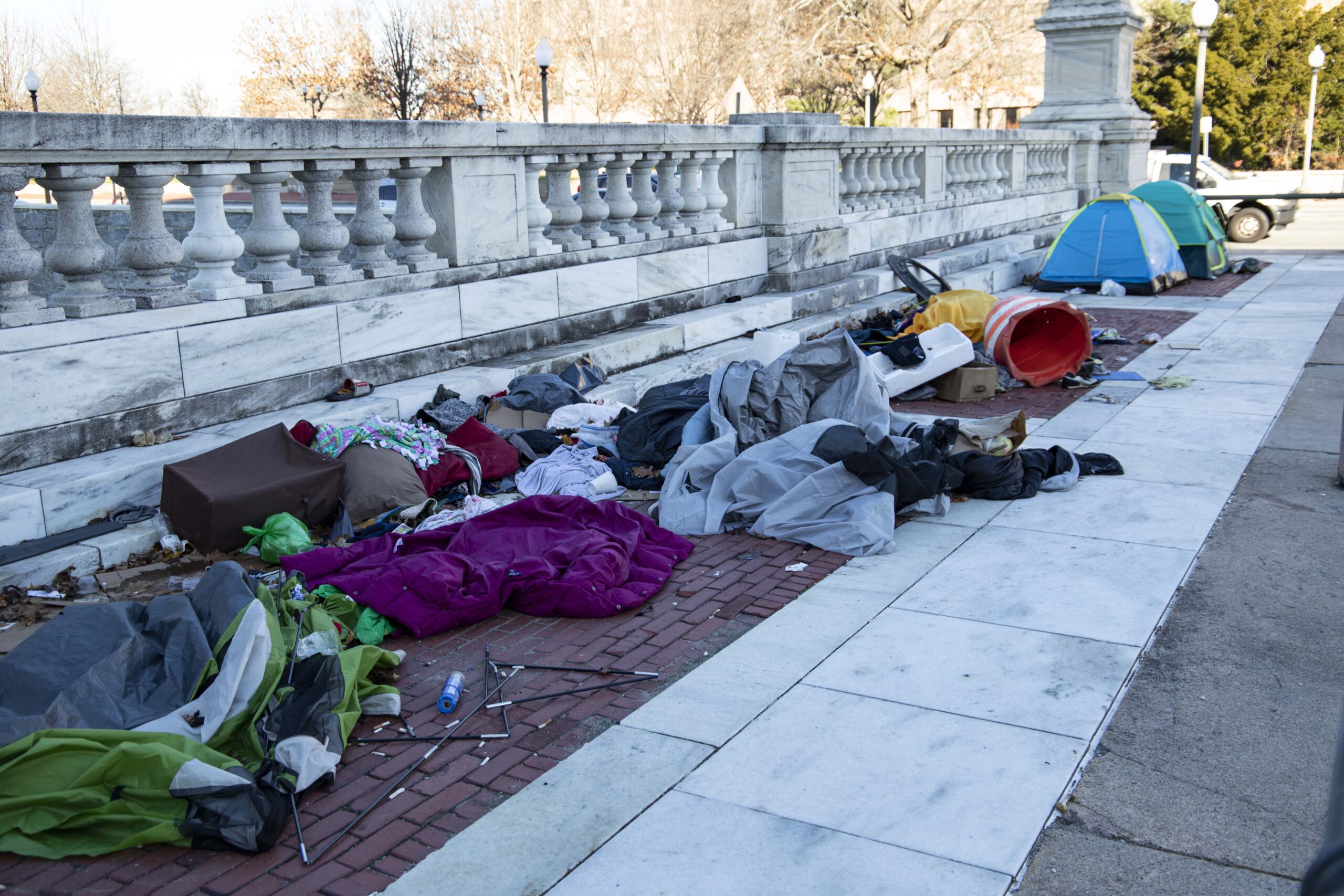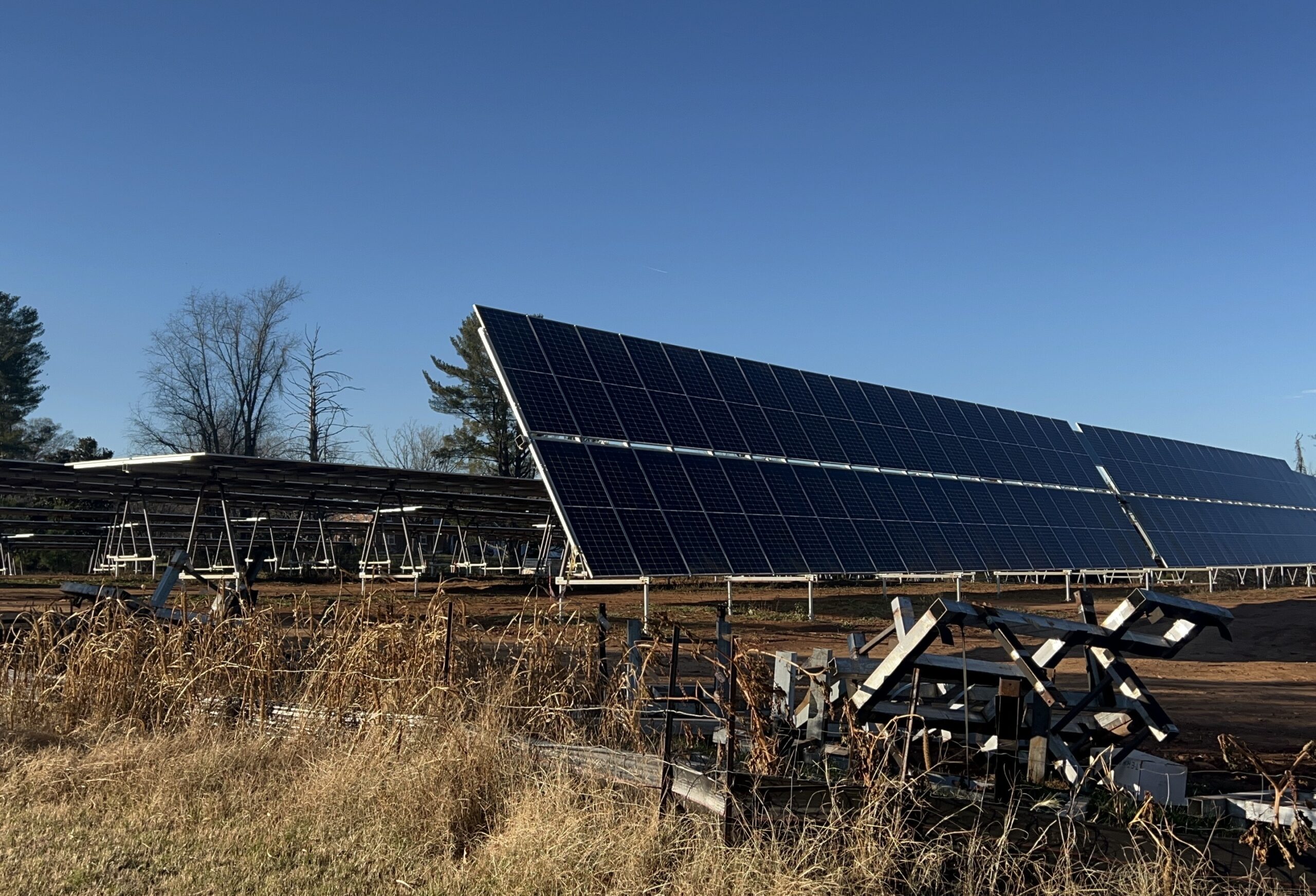(LANCASTER, Pa.) — On June 14, some millions across the county joined the “No Kings Day” protests. The event, billed as “a national day of defiance” drew a surprising turnout in Republican-dominated areas, including Lancaster City, where more than 4,000 attendees were stretched out across Binns Park holding signs and honking their horns to protest President Donald Trump’s planned military parade and many of his policies.
Alice Yoder, 55, was one of three Lancaster County commissioners to join the protest
“It was transformational,” Yoder said. “It just shows how deeply the community feels about protecting democratic values.”
Lancaster County, located in the South Central part of Pennsylvania, is known for its conservative roots and Amish country. However, the size of last month’s No King’s protest, a special election in which a Democrat won a long-held Republican state senate seat, and observations from locals suggest what could be a small shift in the political trajectory for this part of the state.
Michael Sheely, 69, who also attended the No Kings Day protest, described the feeling that swept over him among the crowd of thousands. “What’s interesting to me is that Lancaster is historically conservative. But the older folks I saw during No Kings Day were very refreshing and a little bit surprising.”
Sheely felt encouraged by the number of protesters who showed up.
It was the second sign that things may be changing here. In March, Democrat James Malone beat the Republican incumbent marking the first time a Democrat has represented the 36th district in Pennsylvania’s state senate since 1889. Josh Parsons, the Republican candidate, was endorsed by former Trump ally Elon Musk. Despite that, he lost the race by .89%, a gap too large to trigger an automatic recount, according to WITF.
Yoder, understands the people and says her Democratic values are rooted in personal experience. A clinical nurse and a healthcare administrator for over 20 years, her support for public health carried over to her career as commissioner. Yoder is opposed to federal cuts to hospitals that she says undermine affordable care.
She said that one of her proudest moments as a nurse was serving as the director of maternal-child services at a Lancaster’s hospital. She saw firsthand what it was like for babies to be placed in the NICU, and the expenses that followed. “The NICU is one of the most expensive areas of a hospital,” she said.
The cuts could set all the hard work back that people like Yoder have fought for, as Republican lawmakers continue to make cuts to Medicaid and medical assistance.
”People don’t even know what medical assistance is, so I’ve been spending the last month and a half letting people know what it means,” Yoder said.
Afraid to speak up
Although politicians like Yoder are raising awareness of these types of issues, many people—including medical workers—fear the consequences of speaking up. Taking exception with Trump’s policies in a red county could result in social exile in a county that voted 58% for the president.
“If they speak up too much, they are going to be alienated,” Yoder said. “The people who want to advocate have to watch out for their self-interest.”
Still, the turnout of Lancaster’s No Kings Day protest surprised Yoder. There were thousands of attendees, more than expected. “A couple of thousand was what we were thinking about, Yoder said.
One of the protesters held a sign that read, “If there’s money for a parade, then there’s money for Medicaid.”
Yoder developed Healthy Beginnings Plus, a program that provides care for low-income women early in their pregnancies. The program sends a social worker to the homes of expecting women to promote a healthy pregnancy.
Yoder’s goal was to reduce the number of NICU admissions. “We had such high NICU volumes that we had to divert some women to another hospital because we didn’t have any more beds.”
When women are stressed, Yoder explained, it isn’t good for the baby. The women are mostly single often working at least two jobs. When Yoder and others expanded the program, they only had a year to get the volume that they needed.
“And then we just sort of saw the drops where we had a mother that didn’t have any complications, so she didn’t stay in the hospital for too long,” Yoder said. “But remember, every day, you only get 30 cents on that dollar [under Healthy Beginnings Plus, Pennsylvania’s Medicaid program for prenatal care], so you want to have that person get out as quickly as possible, from a financial standpoint. And same thing for the baby, you want them not to be in the NICU.”
Yoder is concerned about the future of these types of programs, considering the significant cuts made toward Medicaid.
She noted that many who agree with the No King’s Day perspective did not attend the protest on June 14 . “It’s … people who don’t have a voice. They’re not people who advocate because they are typically working two jobs. They don’t have any generational wealth or income,” said Yoder.
The No Kings Day protest was not the first time Yoder went to the streets to make her feelings known. She attended the annual Ephrata Fair Parade before the election in November. Ephrata is located 20 minutes outside of Lancaster City.
You expect the Democratic float to be booed due to deep support of the Republican Party in Lancaster, Yoder said. But last year was different.
“I walked in the parade, and you know it was amazing, and that made me so hopeful. I thought that the election was going to turn out differently because of that.”
‘Tired of the lies’
Yoder has been involved with the Democratic Party ever since she moved to Lancaster, and Ephrata never had a strong Democratic committee, she said. Now, things are changing—a small town in a rural part of the U.S. may see more blue in its future, according to Yoder and others at the protest.
Sheely, who voted for Trump in 2016, explained why he joined the protest this year. “I’m tired of the lies. I think a lot of people are seeing a lot of the lies from the current administration.”
Sheely recalls Trump canvassing in the Amish community during his campaign and state legislators visiting their communities and Republican supporters going door-to-door during 2024’s election season.
Although he agrees that the neighboring areas of Lancaster are very much Republican, he foresees urban communities like Lancaster City leaning more purple.
“I found out through some friends who worked in and around the government that some of the state legislators were visiting the Amish communities, ” he said. “So the outlying areas, Lancaster County, are probably still very red, but the inner city seems to be purple.”
Maima Tucker, 48, of Manheim Township, also sees a political shift in Lancaster County. A respiratory nurse and a mom of three, she believes Malone’s win “captured a growing shift.” Tucker did not attend the protest.
Tucker believes that Trump’s policies are unpopular, “Democrats are scared and widening their base in the county,” she said. “Urban areas like Lancaster City are energized.”
Younger Gen Z protesters said they were focused on civil rights, while individuals who are a bit older, like Sheely, said they are worried about policies that may undercut Medicaid and Social Security.
An article from Her Campus shared the thoughts of an Orlando protester who goes by the pseudonym Mint. This day means wanting to keep this country how it was and what our Founding Fathers fought for, we fought the country from a monarchy to a democracy, and are slowly turning back to a monarchy.”
Blue city in a red county
County-wide change may be harder to find. Lancaster County as a whole voted the same way in the 2020 and 2024 presidential elections, with 58% going for Trump and 42% for Vice President Kamala Harris, according to state election returns.
However, officials like Yoder remain hopeful for changes in the future, “It’s slowly turning,” she said. “I don’t know how many people I’d run into and they’d say, “Are there more Democrats here?” They’re whispering.”
Tucker said Democrats are “dominating offices” in Lancaster, such as Mayor Danene Sorace, known for her progressive policies and passion for social, racial, economic justice, and education and opportunity. She was elected in 2018 as the second female mayor of Lancaster City and re-elected again in 2021. Tucker remains hopeful for the party as leaders like Sorace serve Lancaster City, and Mayor Jaimie Arroyo serves the next term following his win in the Democratic primary last May. The last time Lancaster saw a Republican mayor was in 2006, when Charlie Smithgall completed his term. Following Arroyo’s primary win in May, Lancaster Online reported that no other Republican candidate or others had announced plans to face Arroyo in the fall.
“The willingness of someone to take that chance by being a blue candidate in a red area is very refreshing, and I was pleased to see his success,” Sheely said of Malone’s historic win. He believes that there is a trend towards blue, and that the future will tell if it holds steady.
Trump’s “Big Beautiful Bill, “which was signed into law on July 4, which will create a significant loss for those seeking Social Security benefits and Medicare, policies directly impacting someone like Sheely .
Tucker believes the bill will allow Democrats to flip Congress due to widespread public disapproval. It will have a “positive impact on the midterms,” she said.
People of Lancaster County agree on one thing, and that is how powerful they are when neighboring communities come together, energizing the Democratic Party. “I think I would say, five years ago, I was a little frustrated. Young people, like, this is your future, and I can fight as much as I can, but you have to start showing up.
People get nervous, and they’ll realize we can do this. We have younger people running for office, which is fabulous. With all of that, I feel really hopeful,” said Yoder.






